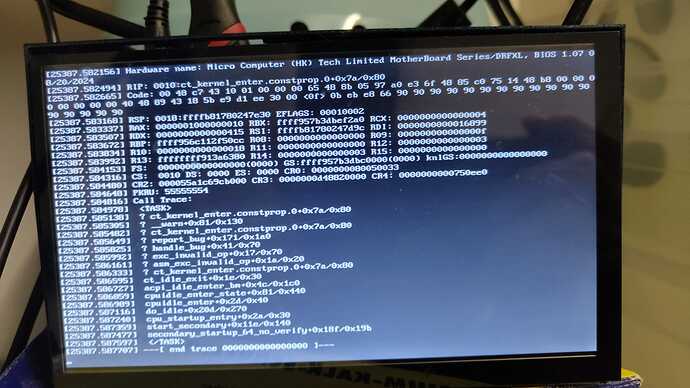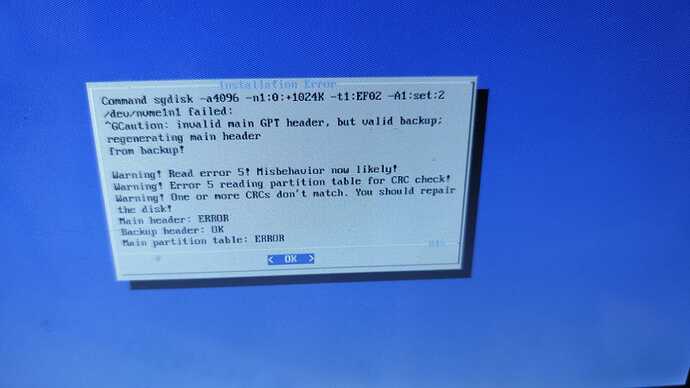Hello Forum,
this is my first post here so hopefully my post I am in the right category.
My Problem:
for some reason my (first) TrueNas Scale nas crashes every 0.27 days ±10min (very regular)
My system:
- MINIS FORUM 790S7
- AMD Ryzen 9 7940HX with Radeon Graphics
- 2x2Tb m.2 nvme SSDs
- 1 external USB boot SSD (I know this is not optimal, but have no choice since I have not enough m.2 / SATA slots)
Things I tried to fix it:
- reseat RAM (and run a short RAM test)
- disable Apps
- disable all overclocking
Some observations
- I get the " ‘boot-pool’ is consuming USB devices ‘sda’ which is not recommended." error I think because of my external boot drive
- when watching the crash event, RAM is normal, CPU usage is normal
- the Web-UI becomes shortly before instable and once I have seen the error " ‘boot-pool’ is consuming USB devices ‘sda’ which is not recommended." reappearing after dismissing it after boot
- after 10min the “freeze” solves itself and the machine runs again with no issues for 0.27 days. You can shorten the 10 minutes by hard shuttig it down and booting again
- The screen is blank in the “freeze” period
These are the error Logs connected to one of the events:
Nov 12 14:49:41 truenas systemd-coredump[360044]: Process 1711 (asyncio_loop) of user 0 dumped core.
Module libsystemd.so.0 from deb systemd-252.26-1~deb12u2.amd64
Module libudev.so.1 from deb systemd-252.26-1~deb12u2.amd64
Stack trace of thread 3731:
#0 0x000000000054d8d0 n/a (python3.11 + 0x14d8d0)
#1 0x000000000050c70e n/a (python3.11 + 0x10c70e)
#2 0x000000000050bcbe n/a (python3.11 + 0x10bcbe)
#3 0x0000000000633477 n/a (python3.11 + 0x233477)
#4 0x00000000004fbe73 _PyObject_GC_New (python3.11 + 0xfbe73)
#5 0x000000000056a27d PyMethod_New (python3.11 + 0x16a27d)
#6 0x0000000000523813 _PyObject_GetMethod (python3.11 + 0x123813)
#7 0x000000000052d1b8 _PyEval_EvalFrameDefault (python3.11 + 0x12d1b8)
#8 0x000000000051fde7 _PyObject_FastCallDictTstate (python3.11 + 0x11fde7)
#9 0x00000000005b528c n/a (python3.11 + 0x1b528c)
#10 0x0000000000518bc6 _PyObject_MakeTpCall (python3.11 + 0x118bc6)
#11 0x000000000052c6a0 _PyEval_EvalFrameDefault (python3.11 + 0x12c6a0)
#12 0x00000000005860d4 n/a (python3.11 + 0x1860d4)
#13 0x0000000000585118 n/a (python3.11 + 0x185118)
#14 0x00000000005138c4 n/a (python3.11 + 0x1138c4)
#15 0x00000000005306f7 _PyEval_EvalFrameDefault (python3.11 + 0x1306f7)
#16 0x000000000055d661 _PyFunction_Vectorcall (python3.11 + 0x15d661)
#17 0x00000000005306f7 _PyEval_EvalFrameDefault (python3.11 + 0x1306f7)
#18 0x00000000005860d4 n/a (python3.11 + 0x1860d4)
#19 0x0000000000585118 n/a (python3.11 + 0x185118)
#20 0x000000000067bf0c n/a (python3.11 + 0x27bf0c)
#21 0x0000000000656cb4 n/a (python3.11 + 0x256cb4)
#22 0x00007f1568dfc134 start_thread (libc.so.6 + 0x89134)
#23 0x00007f1568e7c7dc __clone3 (libc.so.6 + 0x1097dc)
Stack trace of thread 1714:
#0 0x00007f1568df8e96 __futex_abstimed_wait_common64 (libc.so.6 + 0x85e96)
#1 0x00007f1568e03cd0 __new_sem_wait_slow64 (libc.so.6 + 0x90cd0)
#2 0x00000000004f9bb3 PyThread_acquire_lock_timed (python3.11 + 0xf9bb3)
#3 0x000000000058af6f n/a (python3.11 + 0x18af6f)
#4 0x00000000005518ee n/a (python3.11 + 0x1518ee)
#5 0x000000000053b94c PyObject_Vectorcall (python3.11 + 0x13b94c)
#6 0x000000000052c6a0 _PyEval_EvalFrameDefault (python3.11 + 0x12c6a0)
#7 0x00000000005860d4 n/a (python3.11 + 0x1860d4)
#8 0x0000000000585118 n/a (python3.11 + 0x185118)
#9 0x00000000005306f7 _PyEval_EvalFrameDefault (python3.11 + 0x1306f7)
#10 0x00000000005860d4 n/a (python3.11 + 0x1860d4)
#11 0x0000000000585118 n/a (python3.11 + 0x185118)
#12 0x000000000067bf0c n/a (python3.11 + 0x27bf0c)
#13 0x0000000000656cb4 n/a (python3.11 + 0x256cb4)
#14 0x00007f1568dfc134 start_thread (libc.so.6 + 0x89134)
#15 0x00007f1568e7c7dc __clone3 (libc.so.6 + 0x1097dc)
Stack trace of thread 1715:
#0 0x00007f1568df8e96 __futex_abstimed_wait_common64 (libc.so.6 + 0x85e96)
#1 0x00007f1568e03cd0 __new_sem_wait_slow64 (libc.so.6 + 0x90cd0)
#2 0x00000000004f9bb3 PyThread_acquire_lock_timed (python3.11 + 0xf9bb3)
#3 0x000000000058af6f n/a (python3.11 + 0x18af6f)
#4 0x00000000005518ee n/a (python3.11 + 0x1518ee)
#5 0x000000000053b94c PyObject_Vectorcall (python3.11 + 0x13b94c)
#6 0x000000000052c6a0 _PyEval_EvalFrameDefault (python3.11 + 0x12c6a0)
#7 0x00000000005860d4 n/a (python3.11 + 0x1860d4)
#8 0x0000000000585118 n/a (python3.11 + 0x185118)
#9 0x00000000005306f7 _PyEval_EvalFrameDefault (python3.11 + 0x1306f7)
#10 0x00000000005860d4 n/a (python3.11 + 0x1860d4)
#11 0x0000000000585118 n/a (python3.11 + 0x185118)
#12 0x000000000067bf0c n/a (python3.11 + 0x27bf0c)
#13 0x0000000000656cb4 n/a (python3.11 + 0x256cb4)
#14 0x00007f1568dfc134 start_thread (libc.so.6 + 0x89134)
#15 0x00007f1568e7c7dc __clone3 (libc.so.6 + 0x1097dc)
I hope someone can help me. Thanks in advance!

